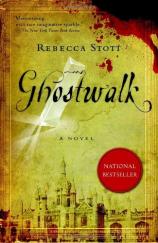Reading Group Guide
Discussion Questions
Ghostwalk

1. Before her death, Elizabeth tells Lydia, “Cambridge is just a palimpsest”–a word meaning a parchment that has been written on, scraped off, and used again. What does she mean by this? How does that metaphor figure in the construction of the novel? Could the metaphor of the palimpsest represent anything else in the novel other than the city?
2. At Elizabeth’s memorial service, Cameron reads lines from the Wallace Stevens poem, “Thirteen Ways of Looking at a Blackbird”:
When the blackbird flew out of sight
It marked the edge
Of one of many circles.
How are these lines relevant to Elizabeth’s death? What edges of circles, or intersecting lives and stories, does Elizabeth now mark even though she has disappeared from sight?
3. Fiction is regarded as a story invented by the imagination, whereas nonfiction is an account based on facts. Both types of literature are found in Ghostwalk, and yet the book is a novel. How do the two forms work together in Ghostwalk—does one enhance the other or detract from it? How effective, in your opinion, is fiction in conveying history? How reliable are historical accounts?
4. The novel suggests that obsession is a dangerous preoccupation that can yield fruitful or disastrous results. What are examples of both outcomes in the novel?
5. Discuss the role of betrayal in the novel. Who betrays whom and why?
6. The narrator is originally skeptical of the supernatural, insisting that she “knew where reason ended and irrationality began, even if Elizabeth had forgotten how to find that edge.” Does Lydia eventually forget how to find that edge of reason despite all her protestations to the contrary? Do you sympathize with her resistance to embrace irrationality and accept the unexplainable? How did you respond to the ghosts in the novel? Did the scientific theories in the novel change your ideas about what we think of as supernatural or beyond the rational?
7. “Glass, alchemy, and politics. You couldn’t separate them out in the 1660s.” Discuss how these elements were intertwined in the 1660s. What parallels can you draw from the 21st century?
8. What was the turning point in the novel where Lydia began believing in the supernatural? When did you first believe that events were more than coincidences? What is the first instance of the past encroaching on the present? How does it proceed from there?
9. Language often contains ambiguities and multiple meanings. Stott engages with the loaded meaning of the verb “to lie” in a number of instances throughout the novel: “You learned about lying on the river when you were working as a punt chauffeur. To lie on, to lie under, to lie close, to lie in wait for.” “Lying to you. Lying with you. Lying for you. Can I remember the difference?” How do the plays of language affect your understanding of the nature of Lydia and Cameron’s relationship? If they had been more forthcoming with each other, do you think events would have unraveled differently?
10. “You couldn’t work in isolation or be independent.” Discuss how Lydia’s statement could apply to all of the principal characters in Ghostwalk. What do they learn or gain from each other? Does that interconnectedness ever work at cross purposes?
11. In Cameron’s explanation of entanglement theory to Lydia, he describes Einstein’s word for the concept as spukhafte Fernwirkungen, or spooky action at a distance, which seems especially appropriate given the supernatural events that occur. How might entanglement theory explain and complicate Elizabeth’s drowning? The series of deaths in Newton’s time and murders in present-day Cambridge? Lydia and Cameron’s relationship?
12. Many of the characters in the novel lead double lives. In which characters is this especially apparent, and how?
13. The narrator states, “There was something ancient and pagan about the animal-liberation campaigns.” What is it about the modern political agenda of animal rights that stirs up the notion of paganism? What is Will’s explanation for the campaigns, the role of NABED, and the Syndicate, and how does it diametrically oppose Cameron’s version of events? What do you think the author’s goal was in presenting these two oppositional viewpoints?
14. Lydia comments after she agrees to finish Elizabeth’s book that writing is a kind of haunting. Do you agree with her sentiment? Do you think it resonates in other forms of art? Which ones? Who or what else haunts Lydia as she struggles to complete the book? Does Lydia finally manage to shrug off her ghosts?
15. At the end of Ghostwalk, Lydia dreams she is in a literal and psychological maze chasing an elusive red figure, a dream that leaves her bewildered and unable to discern reality. Discuss the significance of this dream. What are other instances in Ghostwalk where dreams loom larger than life? How does Stott use dreams as vehicles of discovery and revelation for her characters?
16. How did reading the actual excerpts from Newton’s diary and his recipes for alchemical formulas affect your understanding of him as a character in the story and as a historical and real person? Are there any inferences you can draw from this new understanding of Newton that would alter your perceptions of other important historical figures?
17. “It wasn’t a benign kind of curiosity. It was something dark and ravenous–ravens scavenging over a corpse–dark, urgent, and visceral.” In what way is curiosity shown to have violent consequences in this novel? What does the book seem to have to say about the nature of curiosity?
18. At one point Lydia slightly misquotes a line of Robert Browning’s to Cameron: “My interest’s in the dangerous edge of things. The honest thief, the tender murderer, the superstitious atheist.” How do these lines embody the preoccupations of the novel as a whole?
Ghostwalk
- Publication Date: June 3, 2008
- Paperback: 368 pages
- Publisher: Spiegel & Grau
- ISBN-10: 0385521073
- ISBN-13: 9780385521079








